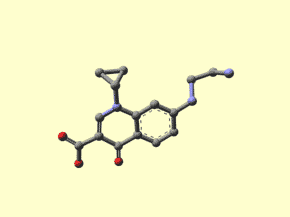 Image from Bayer
Image from Bayer | MICROBIOLOGY AND IMMUNOLOGY ON-LINE |
Ciprofloxacin, also known as Cipro, Ciprobay, Ciproxin, is a 4-quinolone and a member of the fluoroquinolone class of bactericidal antibiotics. It is given by mouth, being rapidly absorbed and penetrating all extra-vascular tissues. It is a synthetic molecule that inhibits bacterial nuclear DNA synthesis by binding to the enzyme DNA gyrase (topoisomerase II). This enzyme, which is needed by the bacterium for genome replication, catalyzes the super-coiling and uncoiling of the DNA. Super-coiling of the DNA is necessary since, otherwise, the DNA would occupy too large a space to fit into the bacterial cell. DNA uncoiling is required for proper replication of the genome when the bacterium divides to form two daughter cells. It is also necessary for transcription of the DNA to messenger RNA and for DNA repair.
 Image from Bayer
Image from Bayer